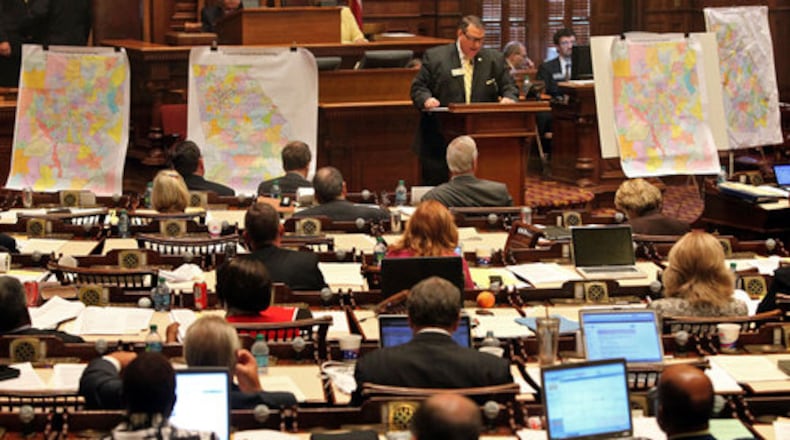A new report from a civil rights organization warns that Black voters could lose representation in Georgia if they’re “packed” together during this year’s redistricting process.
The report says the Republicans who control the General Assembly should avoid relying on race to preserve their control of a changing state when legislators draw new political maps this fall.
Racial discrimination during redistricting could lead to lawsuits, it said. The report, released Friday, was produced by the Lawyers’ Committee for Civil Rights Under Law, a civil rights organization that uses the courts to challenge laws.
Redistricting occurs once every 10 years to ensure each district has an equal number of constituents, a process in which the majority party typically moves voters around to maintain power.
Georgia Republican lawmakers should resist creating districts that give themselves an advantage based on race by consolidating Black voters, who overwhelmingly support Democrats, said Jon Greenbaum, a co-writer of the report.
“Republicans may be incentivized to minimize the voting strength of voters of color by packing those voters into a relatively few number of districts,” said Greenbaum, chief counsel for the Lawyers’ Committee. “Who wins is highly correlated to the racial demographics of a district.”
Democrats almost always win districts with at least 40% Black voter registration, with two exceptions in the 236-person General Assembly: Republican state Reps. Gerald Greene of Cuthbert and David Jenkins of Grantville.
Republicans generally win districts in Georgia that are mostly white, according to the report. Democrats hold just 12 seats in districts that voter registration data show are over 55% white.
Maps that maximize the number of mostly white districts “would appear to be discriminatory,” especially since the state has become more racially diverse over the past decade, according to the report.
Republicans currently hold eight of 14 U.S. House seats and 58% of state legislative districts in Georgia.
Democrats fear they could lose a seat in Congress if two north Atlanta-area districts, represented by U.S. Reps. Carolyn Bourdeaux and Lucy McBath, are combined during redistricting.
No matter how Georgia’s voting maps are drawn, lawsuits are likely to follow. Redistricting battles wound up in court both when Democrats controlled the General Assembly in the 1990s and early 2000s, and while Republicans were in power since then.
The U.S. Justice Department approved Georgia’s maps in 2011, but lawsuits later alleged the state drew districts to reduce the political power of Black voters. The cases were dismissed after the U.S. Supreme Court preserved the practice of drawing districts that give an advantage to one political party over another.
When state lawmakers convene this fall to redistrict the state based on new U.S. census numbers, they’ll have to reapportion a state whose population has grown. Each district must have roughly the same number of voters.
The number of registered voters in Georgia has increased by about 2.5 million since 2012, to 7.8 million total. Meanwhile, the share of white voters has fallen to 53%, an 8-point decline, and Black voters have remained at 30% of the electorate.
Legislators are legally allowed to draw districts that advance their partisan interests, but they can’t create maps primarily motivated by race, according to U.S. Supreme Court rulings. Disagreements over whether lawmakers designed districts based on partisanship or race can lead to litigation.
“The Voting Rights Act says that you can’t pack districts with minority voters, and generally speaking, that requires drawing some unusual looking districts,” said Bryan Tyson, a Republican attorney who will likely be involved in advising legislatures during the redistricting process. “The challenge we’ve had over time is that each political party has its own distinct definition of what is fair.”
Georgia’s redistricting will likely begin at the state Capitol late this year, after the U.S. Census Bureau releases detailed population figures.
Unlike several other states, Georgia lacks an independent redistricting commission to draw maps, meaning partisan legislators hold the power to set the state’s political boundaries. The majority party usually uses redistricting as an opportunity to draw political lines to keep itself in power, and the minority party often challenges maps in court.
The stakes will be high for both political parties. Republicans control both legislative chambers and all state offices, but Democrats made gains when they won both of the state’s U.S. Senate seats and Joe Biden defeated Donald Trump for president.
About the Author
Keep Reading
The Latest
Featured







